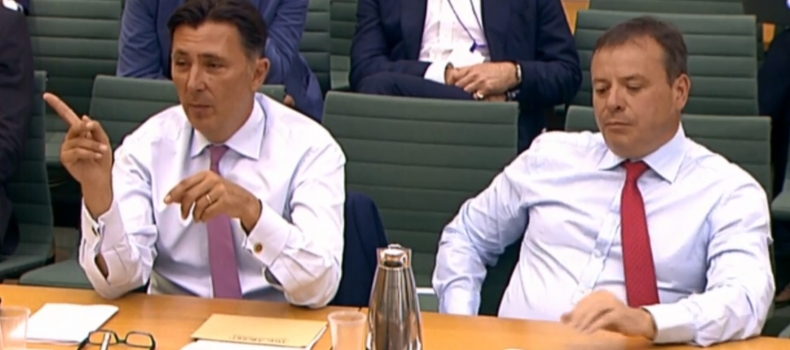 Rutgers University Law Professor Ellen Goodman explains the implications of the decisions taken yesterday by the Federal Communications Commission (FCC), a US government agency, regarding net neutrality.
Rutgers University Law Professor Ellen Goodman explains the implications of the decisions taken yesterday by the Federal Communications Commission (FCC), a US government agency, regarding net neutrality.
In the face of a blistering grassroots campaign, President Obama’s finger wagging, several reversals at court, and at least five years of trying, the FCC has adopted unblinking net neutrality rules. The actual order – coming in at well over 200 pages – will not be available for days or weeks to come, so we are left to piece together the details at our peril. In the same sitting, and by the same partisan 3-2 vote, the FCC took another important and controversial step to alter the course of broadband: it granted the petitions of two smaller cities (Chattanooga, Tennessee and Wilson, North Carolina) to preempt the laws of two states that frustrated municipal plans to build out public broadband. Chairman Tom Wheeler, a former wireless and cable industry lobbyist, boasted at his press conference that, “Today is the proudest day of my public policy life.”
Open Internet: Bright Line Rules and Rules of Reason
On net neutrality, the FCC reversed the decision it arrived at first in 2002 and reaffirmed often since. It explained the reversal: “The nature of broadband Internet access service has …changed [and] broadband providers have even more incentives to interfere with Internet openness today.” Therefore, the FCC declared that it will now treat broadband Internet access providers (wired and wireless) as common carriers, subject to regulation under Title II of the Telecommunications Act. Along with this, the FCC adopted three bright line rules that we’ve seen before: no blocking, no throttling, no fast lanes. Only this time, the Agency applied them to wireless as well as wired networks. And this time, it hopes that the decision to treat ISPs as common carriers will provide an unassailable legal foundation for the rules.
Even though the Agency asserts Title II authority over broadband access providers, the FCC says it will decline to enforce most Title II rules. It will forbear from applying more than 700 regulations, including rate regulation and last-mile unbundling. This decision makes broadband the LEAST regulated of all Title II services. Critics worry that this promise of forbearance will become “fauxbearance” because the Agency can change its mind. That is technically true, but as Harold Feld points out, the wireless industry has been regulated for more than two decades under Title II with forbearance that has satisfied both the industry and consumer advocates. Chairman Wheeler himself, as a wireless industry lobbyist in the 1980’s and 1990’s, was one of the authors of this regulatory strategy and said he “takes heart” from its history of success.
In addition to the bright line rules, the FCC adopted a “future conduct” standard for considering other practices on a case-by-case basis. ISPs cannot “unreasonably interfere with or unreasonably disadvantage the open Internet” – meaning the ability of consumer to access content and applications of their choice, and the ability of edge providers to access all consumers.
One of the most important applications of this “future conduct” standard will be to the practice of zero-rating (also known as sponsored content). The FCC is not saying that a carrier cannot offer toll-free, sponsored content from an edge-provider, but the practice will have to be reasonable in relation to the goals of the open Internet. When asked about the “general conduct” reasonableness standard, Chairman Wheeler said that “We don’t know where things go next.” The standard “allows FCC to sit as referee and throw the flag” as the play develops.
Even less clear is what the FCC will do about interconnection. These are the points where edge providers, such as Netflix, and intermediaries carrying internet traffic, such as Cogent, connect to the networks of ISPs to bring the traffic home. The FCC for the first time asserted jurisdiction over these traffic exchanges; the practices will have to be “just and reasonable.” But the Agency went no further, saying that it wanted to gain more understanding over time of the effects of various practices on the values of an open Internet. The order declines to separate out into two component parts (1) the ISP-to-edge provider service from (2) the ISP-to-consumer service. This was important to Google, which recently expressed concern that such a bifurcation of the integrated end-to-end service would fortify European interest in adopting a “sender pays” model of ISP charges to content providers.
One opponent of the FCC’s order – Randolph May of the Free State Foundation — warned that the FCC will be overrun with “pleas for exemptions” from the new regulations, thereby resurrecting the discredited “’dispensing power’ exercised by the Kings of England through the royal prerogative.” High dudgeon revolutionary rhetoric of this sort is a taste of the conflict to come. Appeals of the FCC’s order are certain to come just as soon as they can be filed. They will most likely take the position that the FCC acted arbitrarily when it did an about-face on the common carrier classification and that, in any case, the statute cannot be read to include broadband access providers in the Title II bucket. The FCC historically does not have a great record on appeals, but it is in a strong position here.
Municipal Broadband to Move Ahead Against States’ Will
In a decision nearly as significant as its net neutrality ruling, the FCC also took the expected – but still remarkable – step of preempting two state laws that have stood in the way of city efforts to build public broadband. Chattanooga and Wilson are two of dozens of cities around the U.S. that are trying to supplement broadband offerings to their residents and businesses. Fed up with the slow buildout of commercial ultra- fast broadband, and with gaps in basic coverage, cities seek to supply service themselves over fiber or power lines or other wired or wireless infrastructure.
In at least 21 states, there are ISP-backed laws to stop cities from providing service. The laws are clearly protectionist, although they also assert valid interests in not having public entities throwing resources at infrastructure that they cannot manage effectively. Many state laws are taken wholecloth from the pro-business, conservative bill farm, American Legislative Exchange Council (ALEC), which has had great success in getting state legislatures to adopt pro-business laws, and otherwise to carry out conservative movement goals. Predictably, ALEC reacted angrily to the FCC’s move to preempt state law on municipal broadband.
Here too, court challenges lie ahead. First, opponents of the FCC’s municipal broadband stance will argue that the FCC does not have the power to preempt state laws without express authorization from Congress. There are particular sensitivities when the Federal government gets between a state and its own cities, which are considered merely creatures of the state and subject to its dominion. In a 2004 case striking down an FCC preemption of state law, Nixon v. Missouri Municipal League, the Supreme Court held that “federal legislation threatening to trench on the States’ arrangements for conducting their own governments should be treated with great skepticism.”
The FCC is relying on a provision of the Telecommunications Act (Section 706(a)) that allows the agency to “remove barriers to infrastructure investment.” It will have a heavy burden in showing that this provision contemplates preemption. So far, the Agency seems to be treading gingerly. In his press conference, Chairman Wheeler noted that the two states at issue have already authorized cities to provide broadband, but then raised barriers on the path to that end. The FCC characterizes its preemption as touching on the barriers, but not the underlying state authorization. Even if this sort of half-pregnant approach succeeds in court, it could invite more vigorous state response: instead of merely restricting the municipality’s ability to invest in broadband, the state might simply forbid it. Preempting this kind of blanket prohibition, if it comes to that, would require the FCC to go all in on its theory and it might well lose. An appeal like this is likely stronger than one on net neutrality.
A second Constitutional challenge will probably be that these municipal broadband networks, by implementing terms of service about network usage, violate the First Amendment rights of citizens. The terms of service are not content-neutral limitations, but seek to restrict obscene, abusive and other forms of “low value” speech. Cities that stay farther away from last-mile retail services, and instead sponsor middle-mile network infrastructure or work through private-public partnerships may be able to avoid these kinds of claims.
What announcing these two initiatives on the same day allowed the FCC to do was paint its critics into a corner. If you oppose net neutrality because you rely on competition to keep the network open, then you should embrace municipal broadband which adds another broadband option to the market. If you distrust public involvement in infrastructure provision, then you should get behind the light-touch regulation of private entities. Unless you’re against it all, which is what the FCC will be facing as it battles legal challenges from Comcast, ATT, and others in the coming months.
This post gives the views of the author, and does not represent the position of the LSE Media Policy Project blog, nor of the London School of Economics and Political Science.





